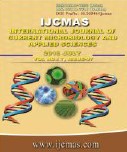


 National Academy of Agricultural Sciences (NAAS)
National Academy of Agricultural Sciences (NAAS)

|
PRINT ISSN : 2319-7692
Online ISSN : 2319-7706 Issues : 12 per year Publisher : Excellent Publishers Email : editorijcmas@gmail.com / submit@ijcmas.com Editor-in-chief: Dr.M.Prakash Index Copernicus ICV 2018: 95.39 NAAS RATING 2020: 5.38 |
Food borne diseases pose an important public health problem in developed and developing countries. The spread of food borne diseases via food handlers is a common and persistent problem worldwide. In developed countries, up to 30% of the population suffers from food borne diseases each year, whereas in developing countries up to 2 million deaths are estimated per year (WHO, Geneva 2007). Objectives of the study are to know the prevalence intestinal parasites and rate of hand washing practices among the food handlers. This study was conducted in all food handlers of Gauhati Medical College and Hospital for a period of one year from June 2013 to May 2014. Stool samples were collected and processed for detection of parasites by macroscopic, direct microscopy, microscopy after formol – ether concentration methods and for enteric pathogens samples were processed in MacConkey agar, DCA, XLD agar, Selenite F broth and identified by standard methods as per CLSI guideline. Total 116 food handlers were studied, out of which 18 (15.52%) cases were found positive for parasites only while no cases were found positive for enteric bacterial pathogens. Protozoa were the most common isolates [10 (8.62%)] of which Entamoeba histolytica [7 (38.88%)] accounted for highest percentage of cases followed by Giardia [3(16.67%)]. Among the Helminths [8 (6.03%)], Ascaris lumbricoides [4 (22.2%)] was the most common finding followed by hookworm [3(16.67%)] and Trichuris trichura [1 (5.56%)]. Hand washing practice after toilet with soap and water was found to be 100%. Hand washing practice after touching dirty materials or different body parts was found to be 75%. From our study as we found that the food handlers might be a source of transmission of pathogens to consumers, so we should give stress on maintaining good personal hygiene specially hand hygiene and hygienic food handling practices for preventing of transmission of pathogens from food handlers to consumers. Hence, we can conclude that the screening of food handlers and training for hand hygiene practices has to be imposed in every health care set up regularly.
 |
 |
 |
 |
 |